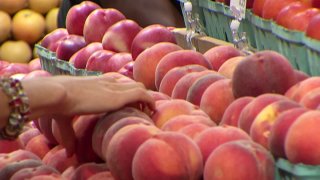
What is driving up the cost of food at the grocery store? That's the question our local leaders are trying to get to the bottom of. In New Haven on Monday, Representative Rosa DeLauro hosted a roundtable discussion with several local and federal agencies discussing what they can do to lower food costs.
"People are struggling. They live paycheck to paycheck, and they can't afford food, they can't afford health care, they can't afford the essentials, and the Federal Trade Commission is at the center of addressing that issue," Rep. DeLauro said.
The Chair of the Federal Trade Commission came to Connecticut to talk with local stakeholders about the price of food.
It's no secret how expensive food is, but the question is why.
Get top local stories in Connecticut delivered to you every morning. Sign up for NBC Connecticut's News Headlines newsletter.
The FTC says over the years, there have been fewer, bigger companies dominating the food industry and they can drive the prices.
"We've heard CEOs boast about how inflation has been really good for them, and there's a lot of interesting data that we're going to be taking a closer look at to understand, even though it made sense that prices went up during the pandemic when there were serious supply chain issues, as those supply chain shortages have eased, why have prices not come down in the same way," said FTC Chair Lina Khan.
One thing the FTC is doing is trying to make sure there's competition.
Local
Earlier this year, the FTC sued to block Kroger's proposed merger with Albertsons, one of the largest grocery mergers in U.S. history, saying it could lead to higher prices. That's still being litigated before a judge in Oregon.
The FTC is also here to listen to local organizations like CitySeed about what they can do to help with food prices. CitySeed operates farmers markets in New Haven.
Their executive director says farmers have faced increasing costs just like everyone else.
CitySeed is encouraging lawmakers to keep farmers and local agencies in mind when passing laws in Washington and not only think about the big guys who have lobbyists.
“There's a lot of investment in big food and less in sort of local food systems, and the infrastructure and the systems needed to maintain that and make local food more accessible and strengthen the whole system around it," said CitySeed Executive Director Sarah Miller.



